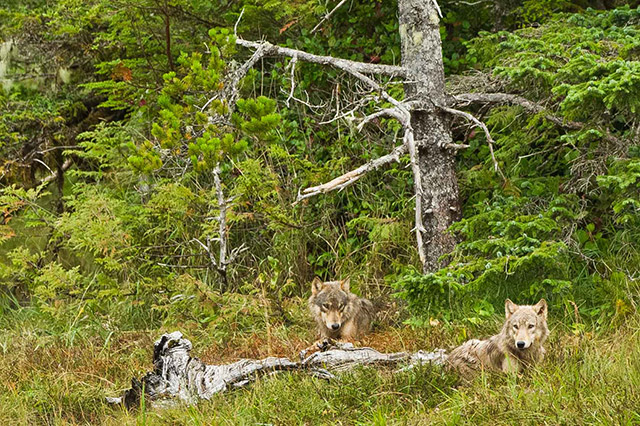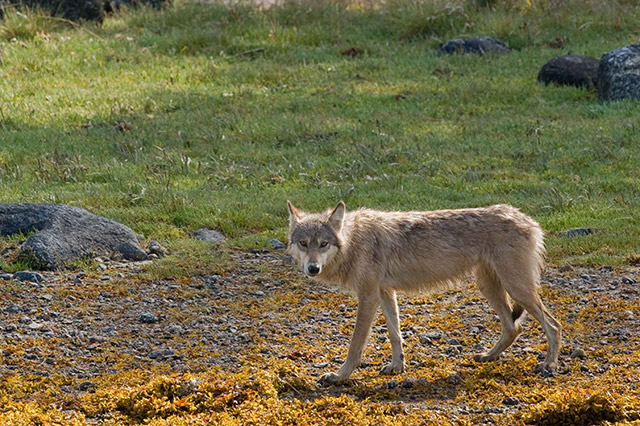|
| |
| 6. September 2014 |
Neue Studie: Küstenwölfe in BC unterscheiden
sich genetisch von den Festlandswölfen |
| |
| Eine Studie von Wissenschaftlern um den Wolfsforscher Chris Darimont von der Raincoast Conservation Foundation weist genetische Unterschiede zwischen den Küstenwölfen und den Festlandswölfen in BC nach. Untersucht wurden fünf Wolfsrudel: zwei Rudel, die auf dem Festland leben und drei Rudel, die auf den Inseln in der direkten Nachbarschaft leben. 1074 Wolfskot-Proben wurden gentechnisch untersucht, sie stammten von 116 verschiedenen Wölfen. Der Artikel von Astrid V. Stronen et al. wurde im BioMed Central publiziert (BMC Ecology 2014, 14:11). Nachfolgend finden Sie eine Zusammenfassung dieses Artikels: |
| „Background |
| Emerging evidence suggests that ecological heterogeneity across space can influence the genetic structure of populations, including that of long-distance dispersers such as large carnivores. On the central coast of British Columbia, Canada, wolf (Canis lupus L., 1758) dietary niche and parasite prevalence data indicate strong ecological divergence between marine-oriented wolves inhabiting islands and individuals on the coastal mainland that interact primarily with terrestrial prey. Local holders of traditional ecological knowledge, who distinguish between mainland and island wolf forms, also informed our hypothesis that genetic differentiation might occur between wolves from these adjacent environments. |
| Results |
| We used microsatellite genetic markers to examine data obtained from wolf faecal samples. Our results from 116 individuals suggest the presence of a genetic cline between mainland and island wolves. This pattern occurs despite field observations that individuals easily traverse the 30 km wide study area and swim up to 13 km among landmasses in the region. |
| Conclusions |
| Natal habitat-biased dispersal (i. e., the preference for dispersal into familiar ecological environments) might contribute to genetic differentiation. Accordingly, this working hypothesis presents an exciting avenue for future research where marine resources or other components of ecological heterogeneity are present.“ |
| (Population genetic structure of gray wolves (Canis lupus) in a marine archipelago suggests island-mainland differentiation consistent with dietary niche. Astrid V Stronen, Erin L Navid, Michael S Quinn, Paul C Paquet, Heather M Bryan, Christopher T Darimont. BMC Ecology 2014, 14:11 (10 June 2014)). |
| Den kompletten Artikel finden Sie unter www.biomedcentral.com/1472-6785/14/11 |
| |
 |
| Zwei Küstenwölfe ruhen am Waldrand und überblicken den Flusslauf |
© Klaus Pommerenke |
|
| |
| Auch im Times Colonist wurde über diese Studie berichtet. Der Artikel von Sarah Petrescu vom 10. Juni 2014 ist im Folgenden wiedergegeben: |
| |
| „Coastal wolves a whole different animal, study finds |
| Sarah Petrescu / Times Colonist |
| |
| Elders of the Heiltsuk First Nation along the B.C. central coast have long recognized the difference between coastal and inland grey wolves in their territory. Now, new scientific evidence helps prove it. A study by Victoria-based researchers, published today in the open-access journal BMC Ecology, affirms genetic, ecological and behavioural differences between coastal and mainland wolves living in close proximity to each other. ‚The idea came from Chester Starr way back but initially we just dismissed it‘, said Chris Darimont, a science director at Raincoast Conservation Foundation and Hakai-Raincoast professor at the University of Victoria. Darimont met the Heiltsuk elder more than a decade ago as a graduate student eager to work in the area environmentalists have since dubbed the Great Bear Rainforest. ‚I wanted to work with a local. He was the guy from the village always out hunting, fishing, doing ecological surveys of the territory. His radio call sign was Lone Wolf‘, said Darimont. The two men were sitting in a boat between a small island and peninsula when Starr asked Darimont if they were studying both the wolves in the area. ‚It sounded totally bizarre at first, that there could be two versions of the species. This definitely reflected my ignorance of indigenous knowledge at the time.‘ Scientific evidence at that point suggested B.C. wolves were genetically similar unless separated by vast distances. But the differences between the wolves in the area were clear. ‚Coastal wolves are smaller than the timber wolves‘, explained Starr. He said mainland wolves have longer legs, can run faster, feast on deer and sometimes breed with dogs. The wolves that live on the remote network of islands and peninsulas tend to stick together, surviving on food from the sea and beaches and some game. Darimont said ecological work done by the team over the last decade showed mainland wolves survived mostly on deer, mountain goats and got about a quarter of their diet from salmon. ‚Then you’d cross these little water bodies and they’d be surviving almost completely on things like salmon, seals, mink, clams, barnacles. Wolves would be chewing mussels off logs at low tide and swimming between islands‘, he said. ‚This broke the rules of wolf behaviour.‘ He also noted a coastal wolf with similar behaviour along Vancouver Island, namely one that famously island-hopped near Oak Bay in 2013 – eating seals and intertidal wildlife. Darimont’s research team collected DNA from more than a thousand samples of wolf scat and found genetic variations. Coastal wolves are more likely to breed with each other. Parasite analysis suggested their immune systems are adapted to their coastal diet and they have a different suite of behaviours in terms of foraging. Darimont said the research shows how ecological development might drive genetic differences and would have significant conservation implications if the wolves are recognized as marine mammals, similar to polar bears. Paul Paquet, a senior Raincoast scientist and supervisor of the study, said: ‚It is imperative that responsible government agencies now recognize coastal wolves are unique and take the opportunity to design management plans that reflect the uniqueness, rather than defaulting to simplistic policies that are convenient but inappropriate from a conservation perspective.‘“ |
| © Copyright Times Colonist |
| |
 |
| Küstenwolf in einer Meeresbucht auf der Suche nach Fressbarem |
© Klaus Pommerenke |
|
| |
 zurück zurück |
|
|

